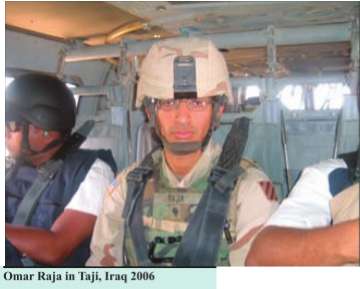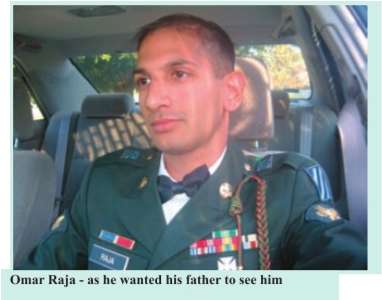Keeping Faith with Grace – Story of a Loyal Pakistani-American Soldier
By C. Naseer Ahmad
“As a child, learn good manners. As a young man, learn to control your passions. In middle age, be just. In old age, give good advice then die, without regret”. I found this text in Ottawa’s Museum of Civilization – Afghanistan Exhibit. These words were etched in stone centuries ago by the Greeks left behind by Alexander the Great. For me, this discovery was worth the two-mile walk across the city from the Canadian House of Parliament on a frigid February day.
Not too far from that location of these excavated remains is Kahuta, Pakistan, the place from where the Rajas of Fairfax originate. Exploring the official records, journal entries and conversation with Rajas one finds the same thread sewn in traditions of fidelity. One finds acceptance of wisdom, allegiance to country and devotion to faith as well as family.
“At night you constantly hear helicopters hovering above; you hear the occasional small arms fire, and explosions every now and then. Everything is barricaded this time, one of the most visible differences this deployment,” wrote Omar Raja in his journal in early May 2007 at the start of the second tour of duty in Iraq.
 Omar is a nice young man, with a deep devotion to his family and its traditions. He enlisted with the US Army for a four-year commitment after finishing his undergraduate degree at Virginia Tech, Blacksburg, Virginia. His demeanor is low-key; he is soft-spoken but well organized and diligently discharges his duties. So it is not a surprise to note how people feel about it. They like him and let it be known and he records it well. For instance, the May 12, 2007 journal entry notes the quote of the day attributed to Sergeant First Class (SFC) McFadden, Re-enlistment Non-Commissioned Office (NCO): “Raja, let me tell you something, if I got you to re-enlist, one, it would be an honor, and secondly I would feel like I actually accomplished something out here. I would feel like the king of the world.”
Omar is a nice young man, with a deep devotion to his family and its traditions. He enlisted with the US Army for a four-year commitment after finishing his undergraduate degree at Virginia Tech, Blacksburg, Virginia. His demeanor is low-key; he is soft-spoken but well organized and diligently discharges his duties. So it is not a surprise to note how people feel about it. They like him and let it be known and he records it well. For instance, the May 12, 2007 journal entry notes the quote of the day attributed to Sergeant First Class (SFC) McFadden, Re-enlistment Non-Commissioned Office (NCO): “Raja, let me tell you something, if I got you to re-enlist, one, it would be an honor, and secondly I would feel like I actually accomplished something out here. I would feel like the king of the world.”
From reading his journals, one feels that Omar applies his education well; he is observant and assertive when necessary. These journal entries are windows in the world behind the bunkers and questions people are curious about. For example:
“ 15 Jan 07
Staff Sergeant: “Raja, I have a question; a personal question, you don’t have to answer if you don’t want to. Umm, are you already arranged to be married?
Raja: No
Staff Sergeant: “So you get to choose?”
Raja: “Of course!”
Staff Sergeant: Oh [walks away quickly]
17 Jan 2007
Raja: So, SSG, what brought on that question yesterday?
SSG: ”Oh, I was just curious, because you’re a nice guy. I was wondering what traditions and values you held sacred. Just curious.”
 Curiosity is nice, as long as it is tactful. And, when questions or comments are not in good taste, control over passion is a good thing – perhaps a necessity to prevent volcanoes from erupting in combat zones. From reading his one stumbles upon the incident when one reckless lieutenant peeks over the screen of his laptop to inquire as to what he was reading, which happened to be a book - “The 48 Rules of Power”. Then without any inhibition blurts ““You’re going to be a little terrorist, aren’t you?”. Omar’s journal entry notes the incredulity of discovering an officer who was not much of a gentleman. And, perhaps the wisdom etched in stones about controlling passions that kept things at room temperature.
Curiosity is nice, as long as it is tactful. And, when questions or comments are not in good taste, control over passion is a good thing – perhaps a necessity to prevent volcanoes from erupting in combat zones. From reading his one stumbles upon the incident when one reckless lieutenant peeks over the screen of his laptop to inquire as to what he was reading, which happened to be a book - “The 48 Rules of Power”. Then without any inhibition blurts ““You’re going to be a little terrorist, aren’t you?”. Omar’s journal entry notes the incredulity of discovering an officer who was not much of a gentleman. And, perhaps the wisdom etched in stones about controlling passions that kept things at room temperature.
During his two tours of duty, he served his country faithfully and returned home safely. In Iraq he was helping keep the communications secure for the pilots and the troops. Here at home, he works as a contractor for Homeland Security to help secure the Homeland with the skills he has achieved along the way.
However, war is not the toughest thing one can face in life. Actually, he was visited by a more brutal reality before he even entered the war zone.
“The one day I was looking forward to was the day I would finally come home after having survived basic combat training at Fort Benning and my first two weeks at Fort Gordon. That was to be the 18 th of December. The night before, I was preparing to come home, having packed everything I was to take home with me and having dressed in my class A uniform, the uniform I really wanted my dad to see me in.” So the December 18, 2003 journal entry starts and it is one that is difficult to finish. Because the night before his Dad had already died.
Within a soldier’s uniform resides the human soul – the soul at rest, not hell bent on killing. And, one gets a glimpse of a soul at rest in Omar’s poem:
The 18th of December, a day we both had anxiously been awaiting for my 2 weeks of leave
But only was I to come home to what I could just not bear to believe
The night before, dressed in uniform, I was preparing for my return home to you
The very same night that you ultimately surrendered your soul to Allah in the ICU
On the drive home from the airport did I inquire about your state
and was told you were in the hospital, not having a clue in the world that I was already too late
Arriving home with a smile on my face, unaware that life had taken a cruel turn
Did I then hear the words “To Allah we belong and to Him must we return. “
-------------------------------------------------------------------------------------

